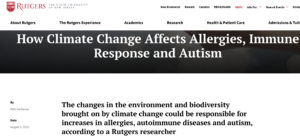https://www.rutgers.edu/news/how-climate-change-affects-allergies-immune-response-and-autism
How Climate Change Affects Allergies, Immune Response and Autism
The changes in the environment and biodiversity brought on by climate change could be responsible for increases in allergies, autoimmune diseases and autism, according to a Rutgers researcher
Climate change and disruption of the ecosystem have the potential to profoundly impact the human body. Xue Ming, professor of neurology at Rutgers New Jersey Medical School, who recently published a paper in the International Journal of Environmental Research and Public Health on the effects of climate change on allergies, autoimmunity and the microbiome — the beneficial microorganisms that live on and inside the human body — discusses how the delicate balance of the environment affects conditions such as allergies, autism and immune disorders.
How has climate change affected respiratory allergies?
Climate change has worsened respiratory allergic disease and has altered the immune system’s tolerance in responding to toxins, which has led to an increase in the prevalence of immune diseases. People with chronic respiratory allergic disease that affects the nose and eyes, such as asthma and allergies, are at particular risk due to increased exposure to pollen and the increased concentration and distribution of air pollutants.
According to the American Academy of Allergy Asthma & Immunology, climate change has both increased the intensity of the pollen season as well as prolonged its duration. Increases in carbon dioxide were shown to lead to an increase in plant reproduction and total pollen levels, especially those plants that thrive at high carbon dioxide concentrations. For example, ragweed pollen has been increasing in concentration, with models predicting that levels will increase by four times within the next 30 years.
Thunderstorms, which have become more frequent due to rising sea temperatures, have been found to increase concentrations of pollen grains at ground level. After absorbing water, these grains can rupture and release allergenic particles that can induce severe asthmatic symptoms in patients with asthma or hay fever.
Climate change has also been linked to increased concentrations and distribution of air pollutants such as ozone, nitric oxide and other volatile organic chemicals. There is a growing body of evidence suggesting that these airborne environmental pollutants may be partially responsible for the substantial increase in allergic respiratory disease seen in industrialized countries over the past several decades.
…
The loss of biodiversity related to climate change may affect the microbiome, potentially leading to inflammatory, autoimmune and neurologic diseases. Immunologic disorders, such as food allergies, are on the rise. For example, several studies have found that increases in carbon dioxide and temperature are correlated with changes in the composition of the peanut, making it more difficult for the body to adapt immunity.
Could disturbances in gut bacteria affect the autism rate?
Disruption of gut bacteria has been linked to neurologic diseases such as multiple sclerosis, autism and Parkinson’s disease. In my own research, I found abnormal amino acid metabolism, increased imbalance between free radicals and antioxidants in the body, and altered gut microbiomes among some patients with autism spectrum disorder.
What steps can be taken to minimize the health risks brought on by climate change?
We must end the destruction of our natural environment, decrease emissions of greenhouse gases and adopt more “green” behavior. With research demonstrating links between the microbiome and autoimmune, inflammatory and neurologic diseases, it is critical that we minimize antimicrobial exposure. This may involve altering guidelines for the prescription of antibiotics by medical professionals. In addition, given that the microbiome is directly impacted by our daily environment it is important to regularly immerse ourselves in nature and familiarize ourselves with biodiverse surroundings.
#
Related:
Heinz funded study: ‘Autism Linked to Man-Made Climate Change’ – ‘According to a press release from the Heinz Endowments, it appears that the mothers of children with autism spectrum disorder were exposed to a number of man-made chemicals and toxins that are the direct result of man-made climate change and global warming events while pregnant, and this may be responsible for their children developing an ASD.’





